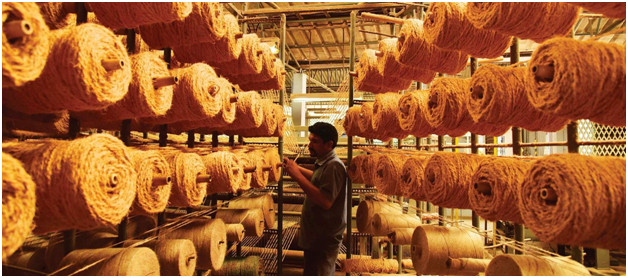Monitoring Occupational Safety & Health Regulations in Coir Industry
ILO's project Local Empowerment through Economic Development (LEED+) conducted a value chain assessment and found that the coir sector has high potential to create jobs for local people. Thereafter the project drew up strategy to unlock these opportunities through the promotion of private sector investments. During the assessment, the ILO identified STR products as an enterprise with great prospects. With support from the ILO’s LEED project, Sharmili was able to become compliant in Occupational Safety and Health (OSH) standards at the workplace. The ILO engaged with the National Institute of Occupational Safety and Health (NIOSH) to assess the situation and walked through the implementation of all recommendations with STR Products. The interventions and technical developments also helped increase productivity of STR Products.
Sharmili and her family together with the ILO Country Director, Ms Simrin Singh “Employee turnover reduced, and improved workstations have increased worker efficiency,” Sharmili. In addition to improved labour standards, the workers are paid full salaries, emoluments, statutory dues and have structured work hours.
With support from the Australian and Norwegian Governments, the ILO is working to empower local communities in Sri Lanka’s Northern Province. Through its LEED+ project the ILO is engaging with cooperatives and small and medium enterprises (SMEs), linking them to large private sector companies through its market access component.
The project works to promote decent employment with a focus on gender equality and inclusivity for persons with disabilities.
The project has been supported by the Department of Foreign Affairs and Trade of the Government of Australia and the Government of Norway and implemented by the ILO in collaboration with its constituents (Government, Workers’ and Employers’ Organizations).
A local entrepreneur, Sharmili Thiyaharan (33), saw an opportunity in all the lorry loads of discarded coconut husks, which were making their way to factories in the southern provinces.
“My husband and I participated in an exhibition organized by the Coconut Cultivation Board - Northern Regional Office—this is what stirred our interest; the potential for processed coconut fibre and its value-added products. Not satisfied with the industry insight she gained, she immersed herself in the trade before starting her own business venture.
“On the job experience and technical knowhow is the cornerstone of success, to sustain in a new trade,” Sharmili said. “I apprenticed with ‘Lanka Trade Pvt. Ltd. to learn the ropes and soon after launched my own start-up - STR Products.”
Similar to entrepreneurs in her community, Sharmili faced challenges in sourcing capital for her enterprising plans. She made a business decision to start operations by first becoming a supplier to Lanka Trade. Six months later she bought a fibre extraction machine with support from a local bank and started producing coconut husk fibre and coco peat. The business grew and she now employs 18 women.
However, the business faced a turning point in terms of continuity following a serious accident in which a worker got hurt. The other workers refused to continue their work due to concerns about the safety of the workplace. The rural setting magnified local community attention and adversely affected her business’s reputation. Government oversight bodies pushed her to take the required safety measures.



